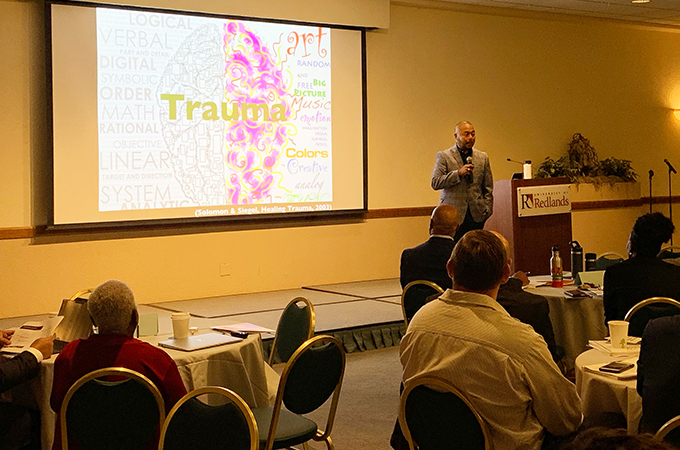On July 9, educators from across Southern California gathered at the University of Redlands for the 15th annual Summer Institute on Leadership for Educational Justice. A day-long event, the institute hosted various panels and talks that focused on educational theory, equity, and policy development. Superintendents and teachers from 11 school districts throughout the Inland Empire were in attendance.
“It’s hard to believe this is our fifteenth year,” said Jose Lalas, director of the Center for Educational Justice. “We’re enriching our understanding of what social justice means. Not just theoretically, not just pedagogically, but also educationally and in a practical sense of how we create educationally just classrooms.”
Lalas introduced keynote speaker Patrick Camangian, an associate professor and department chair of teacher education at the University of San Francisco. After spending 15 years teaching in inner-city schools in Los Angeles and Oakland, Camangian began to conduct research on humanizing education in order to improve learning outcomes for historically underserved student populations.
In his talk, titled “Students Deserve Humanization Instead of Just Social and Emotional Learning: A Theoretical, Psychological, and Pedagogical Perspective,” Camangian utilized his personal background to explore the experiences that many students of color face in the classroom. Growing up in Los Angeles as a child of Filipino immigrants, he couldn’t relate to the narratives taught in elementary school. He remembered thinking, “What does this have to do with me?”
Camangian believes his teachers lacked the cultural competency to account for the unique experiences of every student. After receiving poor grades throughout his childhood and adolescence, he joined a neighborhood gang—something that gave him his first sense of belonging. His gang membership led to an arrest for firearm and marijuana possession, which landed him in prison at 23 years of age.
“I told myself that if I beat my case, I would become the teacher I never had,” said Camangian.
He ended up doing just that. Following years of community college, Camangian graduated from California State University, Los Angeles, and returned to South Los Angeles to serve the community he came from. Years later, he began to combine his experiences as a former student and current educator to inform his research.
“Humanization is based on the liberation of oppressed people,” he said. “History leads us to believe that humanity started in Europe and teaches students of color concepts of self-hate, dividing and conquering, and suboppression.”
These concepts, Camangian argued, encourage students to view oppression as a model for humanity. In order to change this model, he says, educators must transform them:
- From self-hate to knowledge and self-love. “Students internalize the narratives they’re taught, which is why it’s important to allow them to see the world from their points of view,” he said. “Self-love allows people to rewrite the ends of their stories.”
- From divide and conquer to political solidarity. “Structural violence leads to interpersonal violence,” he said. “Students sharing their experiences of oppression with each other fosters solidarity.”
- From suboppression to self-determination. “Largely, white people are the sole models of success for people of color,” he said. “Instead of relying on those models, students can begin to determine what success looks like for their communities.”
In closing, Camangian reminded the audience that, in order to help students facing systemic challenges, teachers must examine their own pasts first: “The personal strategies that you develop to address your psychic, social, and emotional pain will turn into pedagogical ones.”
Learn more about the School of Education and the Center for Educational Justice.






